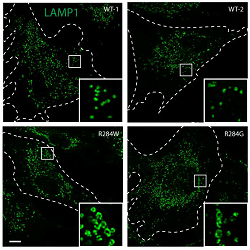
A new paper in The American Journal of Human Genetics has been published by a UK-Italian collaboration co-led by CIMR’s Dr Evan Reid and Prof. Lucy Raymond, together with Dr Marco Tartaglia (ICRCC, Rome). Rapid whole genome sequencing of children in neonatal intensive care, combined with detailed analyses of genomic databases identified patients with a novel severe neurodevelopmental syndrome (termed CIMDAG), who all had mutations in the VPS4A gene. Dr Catherine Rodger and Dr Rachel Allison from the Reid Lab then undertook detailed molecular and cellular modelling of these mutations, including in stem cell-derived human neurons. VPS4A is a master regulator of the ‘endosomal sorting complexes required for transport’ (ESCRTs), cellular machinery that is active in many different membrane fission processes. The VPS4A mutations disrupted key cellular processes including endosomal trafficking and cell division. This research illustrates how the causes of devastating diseases can be understood by combining powerful genomics with cellular and molecular biology.

